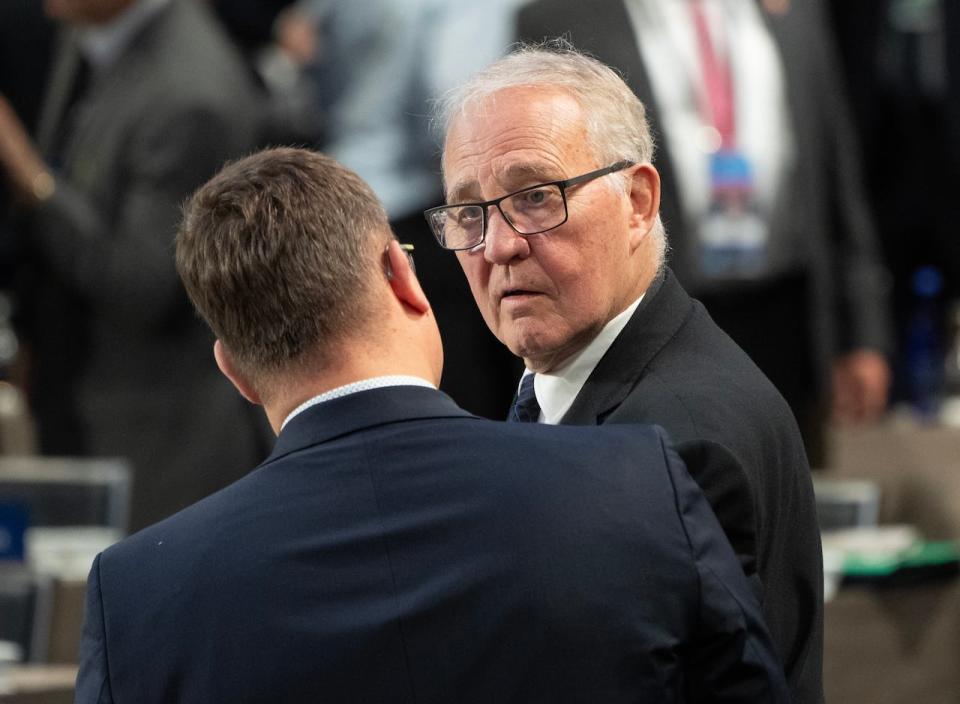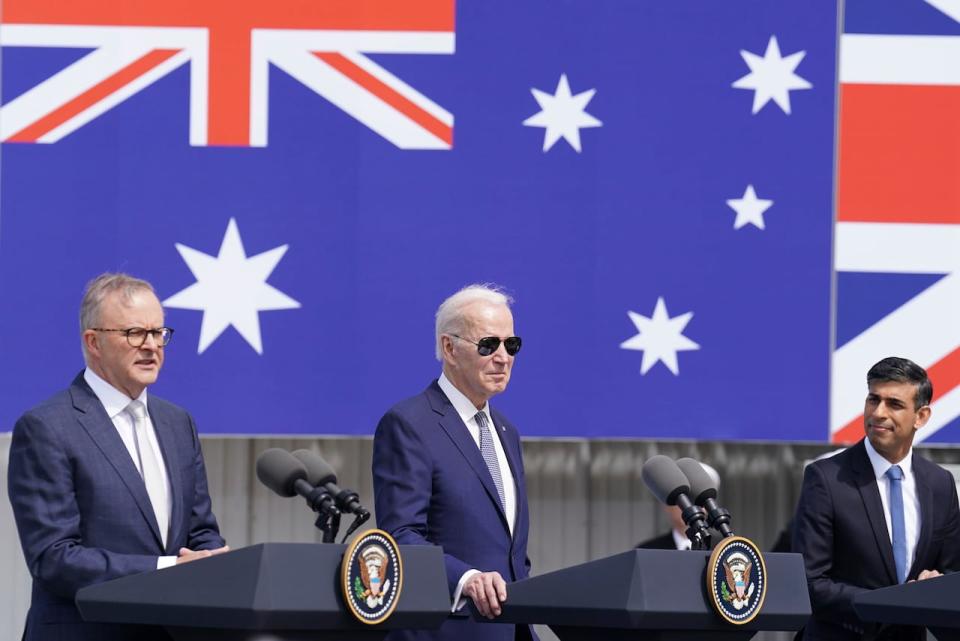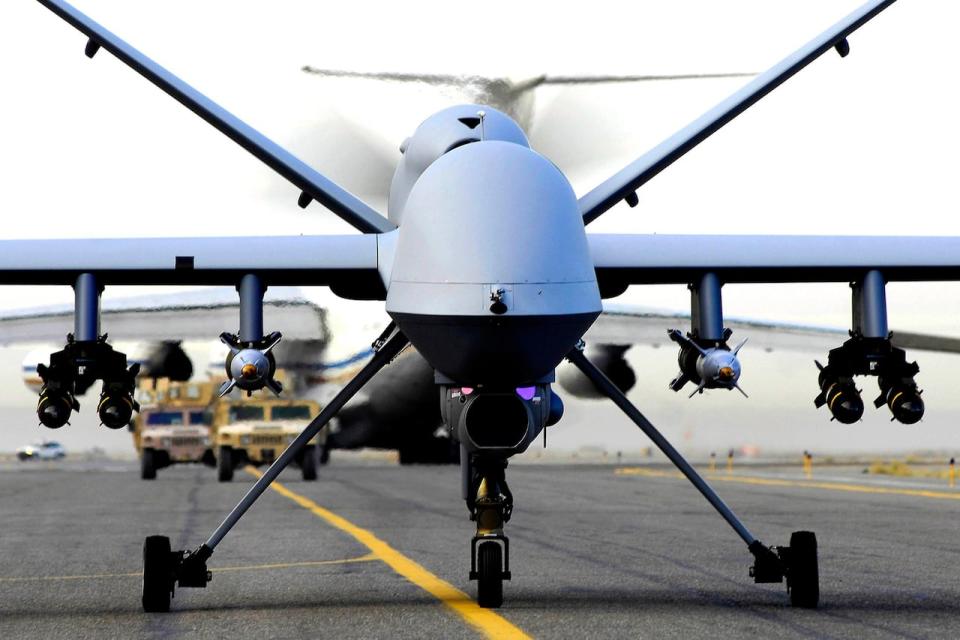Australia is joining the United States and the United Kingdom in developing top-secret cloud networks to exchange highly classified defence, national security and intelligence data with each other — a concept Canada has just begun to think about.
Experts say that, unless the gap is closed quickly, Canada’s lack of such digital infrastructure will have a profound impact on new military hardware the federal government has committed to purchasing, such as F-35 stealth fighters, MQ-9 Reaper drones and long-range P-8 surveillance planes.
The gap is also putting Canada at a disadvantage in negotiations to become part of the high-tech portion of AUKUS, the trilateral defence and technology partnership involving the United States, Australia and the United Kingdom.
The AUKUS nations are also part of the Five Eyes intelligence alliance — New Zealand and Canada are the remaining partners. So three out of five countries in Canada’s most important intelligence alliance are now exchanging highly classified information in secure cloud-based systems to which Canada has no access.

Defence Minister Bill Blair said he doesn’t want to see Canada’s ‘most sensitive data stored in another country.’ (Adrian Wyld/The Canadian Press)
While Defence Minister Bill Blair acknowledged the government “has some work to do” on the problem, he insisted it’s being taken seriously and said it’s vital for Canada to continue holding and protecting its most sensitive data.
“I want autonomy. I want control over our data,” Blair told CBC News in a recent interview.
“I don’t want Canada’s most sensitive data stored in another country. I want Canada to be able to control its own data and to know with confidence that it’s secure.”
Right now, Blair said, Canada’s secret data is stored on physical servers in this country. To get a secure cloud network of its own, Canada would have to hire a major foreign tech company like Amazon to build one.
But if Canada still doesn’t have that separate cloud network by the time data-generating weapons systems like the F-35s come into service, it might have to purchase access to one of those tech companies’ own cloud networks — undermining the autonomy Blair says he wants to protect.
More than four years ago, Australia began moving swiftly to build its secure cloud infrastructure.
Andrew Shearer, director-general of Australia’s Office of National Intelligence (ONI), revealed the existence of the project during a fireside chat with the Washington-based Center for Strategic and International Studies last December.
The secret cloud would facilitate the exchange of vast amounts of classified data among the Australian, American and British intelligence services, he said.
Australia has since gone on to sign a contract worth almost $1.9 billion Cdn with Amazon Web Services (ASW) — a subsidiary of the U.S. tech giant Amazon — to host Australia’s defence, security and intelligence data.


Britain’s Prime Minister Rishi Sunak, right, meets with U.S. President Joe Biden and Prime Minister of Australia Anthony Albanese, left, at Point Loma naval base in San Diego, U.S., on March 13, 2023. The three leaders gathered to announce the new AUKUS trilateral security pact. (Stefan Rousseau/The Associated Press)
The United Kingdom established its secret cloud in 2021, also with ASW. The Pentagon and the U.S. intelligence community use both ASW and Microsoft for their high-security cloud system.
Canada only got into the game last spring, when Prime Minister Justin Trudeau announced Ottawa would embark on a government-wide sovereign computing strategy to bolster domestic artificial intelligence development.
Innovation, Science and Industry Minister François-Philippe Champagne followed up last June by announcing public consultations on how to harness the $2 billion attached to the strategy.
According to the Innovation, Science and Economic Development Canada (ISED) website, the aim of the consultation is to engage “researchers, innovators and businesses in identifying the best strategies for investing in Canada’s AI future.”
“We know that in the future our data requirements will far exceed [the] capacity [of the government’s servers],” Blair said. “And so … I don’t want to have to go to a foreign company, a private company in a foreign country” to access data collected by the Canadian military and security establishment.
But that’s precisely what the federal government might have to do as new military assets, such as the F-35s and new frigates, enter active service.


The MQ-9 Reaper drone is another piece of military tech that needs a secret cloud system to operate at peak efficiency. (Staff Sgt. Brian Ferguson/The Associated Press)
All of these new weapons systems need a secret cloud network to function at their full potential. Without a dedicated, sovereign cloud network of its own, the Department of National Defence (DND) would be forced to store the data these systems generate on a contract basis — likely with a U.S. tech company subject to American law.
“Cloud technology is basically a real critical enabler to allow all the different parts of the military the ability to soak in information and then go out and use it,” said Dave Perry, president of Canadian Global Affairs Institute.
The recent update to Canada’s defence policy refers to digitalization of the military, but its reference to secret cloud networks is buried among many other initiatives in the document.
AUKUS caught Ottawa off-guard
Several defence experts, including Perry, say the lack of emphasis on sovereign cloud infrastructure will mean the Five-Eyes alliance becomes more of a “three-eyes” partnership — which could undermine Canada’s bid to join the high-tech pillar of the AUKUS security arrangement.
There’s always a hint of wounded pride among senior Canadian defence officials whenever AUKUS is mentioned. Being excluded from an assembly of Canada’s oldest, closest allies and intelligence partners dealt a blow to this country’s sometimes delicate sense of its place in the world.
The establishment of AUKUS in 2021 blindsided the Trudeau government, which initially dismissed it as a deal to secure nuclear-powered submarines for Australia. But it has been pointed to repeatedly by critics as evidence that Canada is no longer taken seriously, or considered a reliable security partner, by its friends.
Perry said Australia appears to have been more clear-eyed and determined than Canada.
“Australia was looking at the threat, making investments in the kind of capabilities that they think are needed. They launched a mechanism to actually go about and acquire it,” said Perry.
“In a Canadian context, the timeline is lightning-fast.”
Daniel Araya, an expert in artificial intelligence and a senior fellow with the Centre for International Governance Innovation (CIGI), said he believes Ottawa’s complacency has caught up with it — and negotiations to get into AUKUS will not be a slam-dunk.
‘It’s humiliating’
“I don’t think we’re taking it seriously,” said Araya. “The truth is … the [security] umbrella that the U.S. provides covers us. So in practical terms, it’s not critical that Canada be directly involved” with its own secret cloud.
“Having said that, it’s humiliating,” he added. “I think it undermines our credibility and I think it saps some of our self-confidence.”
The federal government will have to overcome some hurdles if it wants to catch up, Araya said, citing the military’s deep-seated reluctance to entrust the private sector with top-secret data.
“It’s a very ponderous bureaucracy,” he said. “There’s some heated discussion across every major military, but because so much of this will depend on the private sector, I think there’s a certain amount of [internal] resistance.”
On the other hand, he said, there are good reasons to be alarmed by how big tech companies can hold governments hostage on high-security, high-stakes projects such as this.
“The military is notorious for spending too much on products, whether it’s hardware, software. That’s probably going to happen here,” Araya said.
The solution, he said, is for Ottawa to nurture small domestic AI and cloud-based providers to generate alternatives — something the federal strategy launched earlier this year is supposed to do. But the federal government can’t afford to sit on its hands, he added.
“We should be stepping up,” he said. “I think better leadership’s needed at the federal level.”

